- Home
- Vladimir Nabokov
Look at the Harlequins!
Look at the Harlequins! Read online
BOOKS BY Vladimir Nabokov
NOVELS
Mary
King, Queen, Knave
The Defense
The Eye
Glory
Laughter in the Dark
Despair
Invitation to a Beheading
The Gift
The Real Life of Sebastian Knight
Bend Sinister
Lolita
Pnin
Pale Fire
Ada or Ardor: A Family Chronicle
Transparent Things
Look at the Harlequins!
SHORT FICTION
Nabokov’s Dozen
A Russian Beauty and Other Stories
Tyrants Destroyed and Other Stories
Details of a Sunset and Other Stories
The Enchanter
DRAMA
The Waltz Invention
Lolita: A Screenplay
The Man from the USSR and Other Plays
AUTOBIOGRAPHY AND INTERVIEWS
Speak, Memory: An Autobiography Revisited
Strong Opinions
BIOGRAPHY AND CRITICISM
Nikolai Gogol
Lectures on Literature
Lectures on Russian Literature
Lectures on Don Quixote
TRANSLATIONS
Three Russian Poets: Translations of Pushkin,
Lermontov, and Tiutchev
A Hero of Our Time (Mikhail Lermontov)
The Song of Igor’s Campaign (Anon.)
Eugene Onegin (Alexander Pushkin)
LETTERS
The Nabokov-Wilson Letters: Correspondence between
Vladimir Nabokov and Edmund Wilson, 1940–1971
Vladimir Nabokov: Selected Letters, 1940-1977
MISCELLANEOUS
Poems and Problems
The Annotated Lolita
FIRST VINTAGE INTERNATIONAL EDITION, JUNE 1990
Copyright © 1974 by Article 3c Trust under the Will of Vladimir Nabokov
All rights reserved under International and Pan-American Copyright Conventions. Published in the United States by Vintage Books, a division of Random House, Inc., New York. Originally published by McGraw-Hill International, Inc. in 1974. This edition published by arrangement with the Estate of Vladimir Nabokov.
Library of Congress Cataloging-in-Publication Data
Nabokov, Vladimir Vladimirovich, 1899–1977.
Look at the Harlequins! / Vladimir Nabokov.
p. cm.—(Vintage international)
eISBN: 978-0-307-78778-1
I. Title.
PS3527.A15L65 1990
813’.54—dc20 89-40553
v3.1
To Véra
I. OTHER BOOKS BY THE NARRATOR
IN RUSSIAN:
Tamara 1925
Pawn Takes Queen 1927
Plenilune 1929
Camera Lucida (Slaughter in the Sun) 1931
The Red Top Hat 1934
The Dare 1950
IN ENGLISH:
See under Real 1939
Esmeralda and Her Parandrus 1941
Dr. Olga Repnin 1946
Exile from Mayda 1947
A Kingdom by the Sea 1962
Ardis 1970
Contents
Cover
Other Books by This Author
Title Page
Copyright
Dedication
Other Books by the Narrator
Part One
Chapter 1
Chapter 2
Chapter 3
Chapter 4
Chapter 5
Chapter 6
Chapter 7
Chapter 8
Chapter 9
Chapter 10
Chapter 11
Chapter 12
Chapter 13
Part Two
Chapter 1
Chapter 2
Chapter 3
Chapter 4
Chapter 5
Chapter 6
Chapter 7
Chapter 8
Chapter 9
Chapter 10
Part Three
Chapter 1
Chapter 2
Chapter 3
Chapter 4
Part Four
Chapter 1
Chapter 2
Chapter 3
Chapter 4
Chapter 5
Chapter 6
Chapter 7
Part Five
Chapter 1
Chapter 2
Chapter 3
Part Six
Chapter 1
Chapter 2
Part Seven
Chapter 1
Chapter 2
Chapter 3
Chapter 4
About the Author
Books by Vladimir Nabokov
Part One
1
I met the first of my three or four successive wives in somewhat odd circumstances, the development of which resembled a clumsy conspiracy, with nonsensical details and a main plotter who not only knew nothing of its real object but insisted on making inept moves that seemed to preclude the slightest possibility of success. Yet out of those very mistakes he unwittingly wove a web, in which a set of reciprocal blunders on my part caused me to get involved and fulfill the destiny that was the only aim of the plot.
Some time during the Easter Term of my last Cambridge year (1922) I happened to be consulted, “as a Russian,” on certain niceties of make-up in an English version of Gogol’s Inspector which the Glowworm Group, directed by Ivor Black, a fine amateur actor, intended to stage. He and I had the same tutor at Trinity, and he drove me to distraction with his tedious miming of the old man’s mincing ways—a performance he kept up throughout most of our lunch at the Pitt. The brief business part turned out to be even less pleasant. Ivor Black wanted Gogol’s Town Mayor to wear a dressing gown because “wasn’t it merely the old rascal’s nightmare and didn’t Revizor, its Russian title, actually come from the French for ‘dream,’ rêve?” I said I thought it a ghastly idea.
If there were any rehearsals, they took place without me. In fact, it occurs to me now that I do not really know if his project ever saw the footlights.
Shortly after that, I met Ivor Black a second time—at some party or other, in the course of which he invited me and five other men to spend the summer at a Côte d’Azur villa he had just inherited, he said, from an old aunt. He was very drunk at the moment and seemed surprised when a week or so later on the eve of his departure I reminded him of his exuberant invitation, which, it so happened, I alone had accepted. We both were unpopular orphans, and should, I remarked, band together.
Illness detained me in England for another month and it was only at the beginning of July that I sent Ivor Black a polite postcard advising him that I might arrive in Cannes or Nice some time next week. I am virtually sure I mentioned Saturday afternoon as the likeliest date.
Attempts to telephone from the station proved futile: the line remained busy, and I am not one to persevere in a struggle with faulty abstractions of space. But my afternoon was poisoned, and the afternoon is my favorite item of time. I had been coaxing myself into believing, at the start of my long journey, that I felt fairly fit; by now I felt terrible. The day was unseasonably dull and damp. Palm trees are all right only in mirages. For some reason, taxis, as in a bad dream, were unobtainable. Finally I boarded a small smelly bus of blue tin. Up a winding road, with as many turns as “stops by request,” the contraption reached my destination in twenty minutes—about as long as it would have taken me to get there on foot from the coast by using an easy shortcut that I was to learn by heart, stone by stone, broom by brush, in the course of that magic summer. It appeared anything
but magic during that dismal drive! The main reason I had agreed to come was the hope of treating in the “brilliant brine” (Bennett? Barbellion?) a nervous complaint that skirted insanity. The left side of my head was now a bowling alley of pain. On the other side an inane baby was staring at me across its mother’s shoulder over the back of the seat in front of me. I sat next to a warty woman in solid black and pitted nausea against the lurches between green sea and gray rockwall. By the time we finally made it to the village of Carnavaux (mottled plane trunks, picturesque hovels, a post office, a church) all my senses had converged into one golden image; the bottle of whisky which I was bringing Ivor in my portmanteau and which I swore to sample even before he glimpsed it. The driver ignored the question I put to him, but a tortoise-like little priest with tremendous feet who was getting off before me indicated, without looking at me, a transverse avenue. The Villa Iris, he said, was at three minutes of march. As I prepared to carry my two bags up that lane toward a triangle of sudden sunlight my presumptive host appeared on the opposite pavement. I remember—after the passing of half a century!—that I wondered fleetingly if I had packed the right clothes. He wore plus fours and brogues but was incongruously stockingless, and the inch of shin he showed looked painfully pink. He was heading, or feigned to be heading, for the post office to send me a telegram suggesting I put off my visit till August when a job he now had in Cannice would no longer threaten to interfere with our frolics. He hoped, furthermore, that Sebastian—whoever that was—might still be coming for the grape season or lavender gala. Muttering thus under his breath, he relieved me of the smaller of my bags—the one with the toilet things, medical supplies, and an almost finished garland of sonnets (which would eventually go to a Russian émigré magazine in Paris). Then he also grabbed my portmanteau that I had set down in order to fill my pipe. Such lavishness in the registration of trivialities is due, I suppose, to their being accidentally caught in the advance light of a great event. Ivor broke the silence to add, frowning, that he was delighted to welcome me as a house guest, but that he should warn me of something he ought to have told me about in Cambridge. I might get frightfully bored by the end of a week or so because of one melancholy fact. Miss Grunt, his former governess, a heartless but clever person, liked to repeat that his little sister would never break the rule of “children should not be heard” and, indeed would never hear it said to anybody. The melancholy fact was that his sister—but, perhaps, he had better postpone the explanation of her case till we and the bags were installed more or less.
2
“What kind of childhood did you have, McNab” (as Ivor insisted on calling me because I looked, he thought, like the haggard yet handsome young actor who adopted that name in the last years of his life or at least fame)?
Atrocious, intolerable. There should be a natural, inter-natural, law against such inhuman beginnings. Had my morbid terrors not been replaced at the age of nine or ten by more abstract and trite anxieties (problems of infinity, eternity, identity, and so forth), I would have lost my reason long before finding my rhymes. It was not a matter of dark rooms, or one-winged agonizing angels, or long corridors, or nightmare mirrors with reflections overflowing in messy pools on the floor—it was not that bedchamber of horrors, but simply, and far more horribly, a certain insidious and relentless connection with other states of being which were not exactly “previous” or “future,” but definitely out of bounds, mortally speaking. I was to learn more, much more about those aching links only several decades later, so “let us not anticipate” as the condemned man said when rejecting the filthy old blindfold.
The delights of puberty granted me temporary relief. I was spared the morose phase of self-initiation. Blest be my first sweet love, a child in an orchard, games of exploration —and her outspread five fingers dripping with pearls of surprise. A house tutor let me share with him the ingénue in my grand-uncle’s private theater. Two lewd young ladies rigged me up once in a lacy chemise and a Lorelei wig and laid me to sleep between them, “a shy little cousin,” as in a ribald novella, while their husbands snored in the next room after the boar hunt. The great houses of various relatives with whom I dwelt on and off in my early teens under the pale summer skies of this or that province of old Russia offered me as many compliant handmaids and fashionable flirts as might have done closets and bowers a couple of centuries earlier. In a word, if the years of my infancy might have provided the subject for the kind of learned thesis upon which a paedopsychologist founds a lifetime of fame, my teens, on the other hand, could have yielded, and in fact did yield, quite a number of erotic passages scattered like rotting plums and brown pears throughout an aging novelist’s books. Indeed, the present memoir derives much of its value from its being a catalogue raisonné of the roots and origins and amusing birth canals of many images in my Russian and especially English fiction.
I saw my parents infrequently. They divorced and remarried and redivorced at such a rapid rate that had the custodians of my fortune been less alert, I might have been auctioned out finally to a pair of strangers of Swedish or Scottish descent, with sad bags under hungry eyes. An extraordinary grand-aunt, Baroness Bredow, born Tolstoy, amply replaced closer blood. As a child of seven or eight, already harboring the secrets of a confirmed madman, I seemed even to her (who also was far from normal) unduly sulky and indolent; actually, of course, I kept daydreaming in a most outrageous fashion.
“Stop moping!” she would cry: “Look at the harlequins!”
“What harlequins? Where?”
“Oh, everywhere. All around you. Trees are harlequins, words are harlequins. So are situations and sums. Put two things together—jokes, images—and you get a triple harlequin. Come on! Play! Invent the world! Invent reality!”
I did. By Jove, I did. I invented my grand-aunt in honor of my first daydreams, and now, down the marble steps of memory’s front porch, here she slowly comes, sideways, sideways, the poor lame lady, touching each step edge with the rubber tip of her black cane.
(When she cried out those four words, they came out in a breathless dactylic line with a swift lispy lilt, as if it were “lookaty,” assonating with “lickety” and introducing tenderly, ingratiatingly those “harlequins” who arrived with festive force, the “har” richly stressed in a burst of inspired persuasion followed by a liquid fall of sequin-like syllables).
I was eighteen when the Bolshevist revolution struck—a strong and anomalous verb, I concede, used here solely for the sake of narrative rhythm. The recurrence of my childhood’s disarray kept me in the Imperial Sanatorium at Tsarskoe for most of the next winter and spring. In July, 1918, I found myself recuperating in the castle of a Polish landowner, a distant relation of mine, Mstislav Charnetski (1880–1919?). One autumn evening poor Mstislav’s young mistress showed me a fairy-tale path winding through a great forest where a last aurochs had been speared by a first Charnetski under John III (Sobieski). I followed that path with a knapsack on my back and—why not confess—a tremor of remorse and anxiety in my young heart. Was I right in abandoning my cousin in the blackest hour of Russia’s black history? Did I know how to exist alone in strange lands? Was the diploma I had received after being examined by a special committee (presided over by Mstislav’s father, a venerable and corrupt mathematician) in all the subjects of an ideal lyceum, which I had never attended bodily, sufficient for Cambridge without some infernal entrance test? I trudged all night, through a labyrinth of moonlight, imagining the rustlings of extinct animals. Dawn at last miniated my ancient map. I thought I had crossed the frontier when a bare-headed Red Army soldier with a Mongol face who was picking whortleberries near the trail challenged me: “And whither,” he asked picking up his cap from a stump, “may you be rolling (kotishsya), little apple (yablochko)? Pokazyvay-ka dokumentiki (Let me see your papers).”
I groped in my pockets, fished out what I needed, and shot him dead, as he lunged at me; then he fell on his face, as if sunstruck on the parade ground, at the feet of his king
. None of the serried tree trunks looked his way, and I fled, still clutching Dagmara’s lovely little revolver. Only half an hour later, when I reached at last another part of the forest in a more or less conventional republic, only then did my calves cease to quake.
After a period of loafing through unremembered German and Dutch towns, I crossed over to England. The Rembrandt, a little hotel in London, was my next address. The two or three small diamonds that I kept in a chamois pouch melted away faster than hailstones. On the gray eve of poverty, the author, then a self-exiled youth (I transcribe from an old diary), discovered an unexpected patron in the person of Count Starov, a grave old-fashioned Mason who had graced several great Embassies during a spacious span of international intercourse, and who since 1913 had resided in London. He spoke his mother tongue with pedantic precision, yet did not spurn rotund folksy expressions. He had no sense of humor whatever. His man was a young Maltese (I loathe tea but dared not call for brandy). Nikifor Nikodimovich, to use his tongue-twisterish Christian name cum patronymic, was rumored to have been for years on end an admirer of my beautiful and bizarre mother, whom I knew mainly from stock phrases in an anonymous memoir. A grande passion can be a convenient mask, but on the other hand, a gentlemanly devotion to her memory can alone explain his paying for my education in England and leaving me, after his death in 1927, a modest subsidy (the Bolshevist coup had ruined him as it had all our clan). I must admit, however, that I felt embarrassed by the sudden live glances of his otherwise dead eyes set in a large, pasty, dignified face, of the sort that Russian writers used to call “carefully shaven” (tshchatel’no vybritoe), no doubt because the ghosts of patriarchal beards had to be laid, in the presumed imagination of readers (long dead by now). I did my best to put down those interrogatory flashes to a search for some traits of the exquisite woman whom once upon a time he had handed into a calèche, and whom, after waiting for her to settle down and open her parasol, he would heavily join in the springy vehicle; but at the same time I could not help wondering if my old grandee had escaped a perversion that was current in so-called circles of high diplomacy. N.N. sat in his easy chair as in a voluminous novel, one pudgy hand on the elbow-rest griffin, the other, signet-ringed, fingering on the Turkish table beside him what looked like a silver snuffbox but contained, in fact, a small supply of bead-like cough drops or rather droplets, colored lilac, green, and, I believe, coral. I should add that some information obtained later showed me to be detestably wrong in conjecturing on his part anything but a quasi-paternal interest in me, as well as in another youth, the son of a notorious St. Petersburg courtesan who preferred an electric brougham to a calèche; but enough of those edible beads.

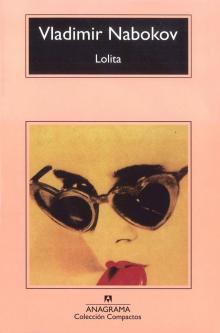 Lolita
Lolita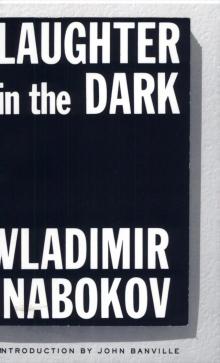 Laughter in the Dark
Laughter in the Dark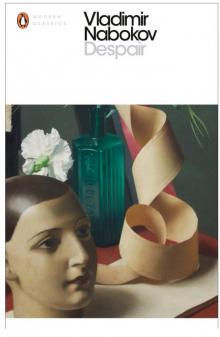 Despair
Despair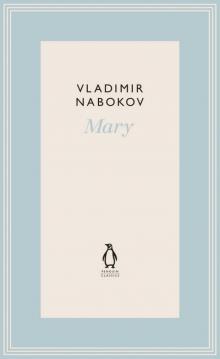 Mary
Mary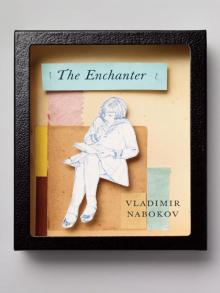 The Enchanter
The Enchanter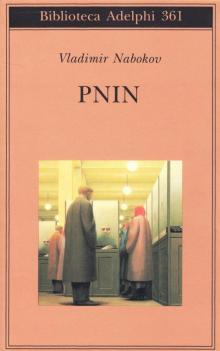 Pnin
Pnin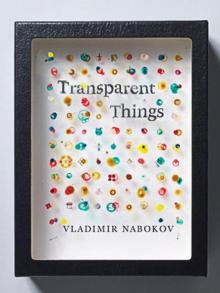 Transparent Things
Transparent Things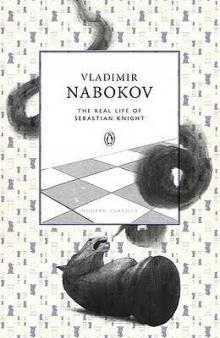 The Real Life of Sebastian Knight
The Real Life of Sebastian Knight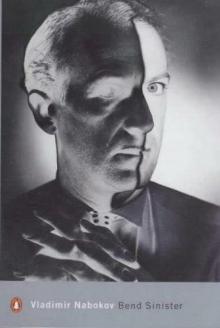 Bend Sinister
Bend Sinister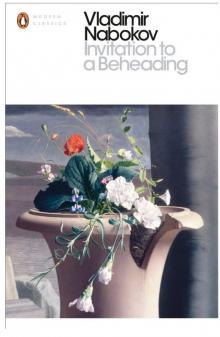 Invitation to a Beheading
Invitation to a Beheading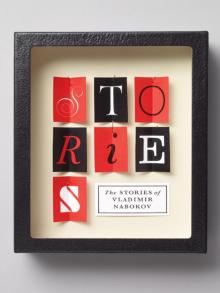 The Stories of Vladimir Nabokov
The Stories of Vladimir Nabokov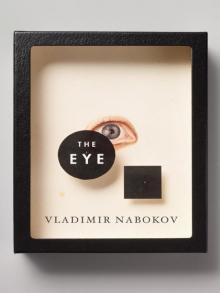 The Eye
The Eye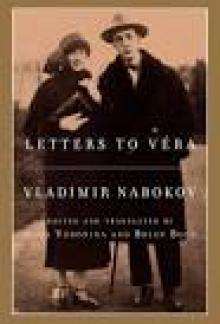 Letters to Véra
Letters to Véra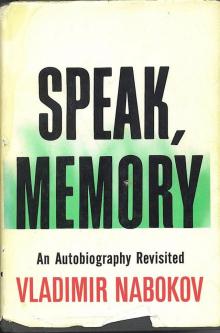 Speak, Memory
Speak, Memory The Gift
The Gift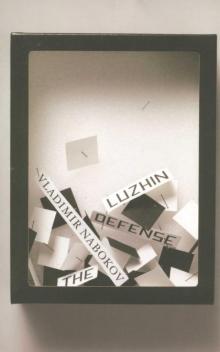 The Luzhin Defense
The Luzhin Defense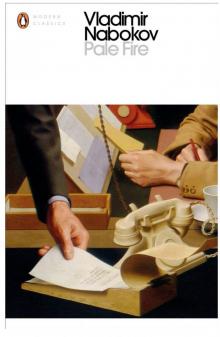 Pale Fire
Pale Fire Glory
Glory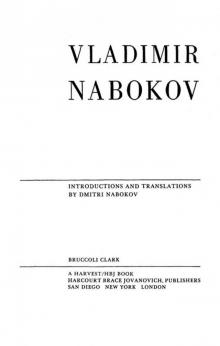 Man From the USSR & Other Plays
Man From the USSR & Other Plays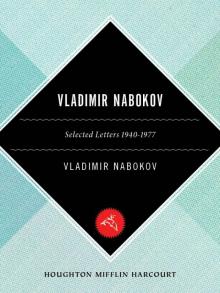 Vladimir Nabokov: Selected Letters 1940-1977
Vladimir Nabokov: Selected Letters 1940-1977 Strong opinions
Strong opinions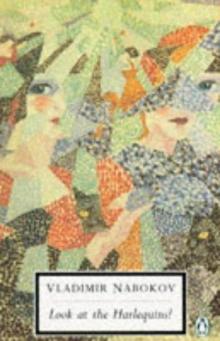 Look at the Harlequins!
Look at the Harlequins!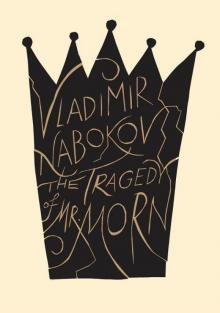 The Tragedy of Mister Morn
The Tragedy of Mister Morn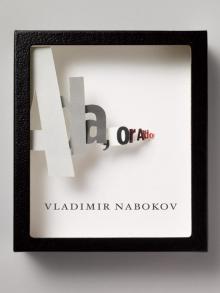 Ada, or Ardor
Ada, or Ardor Lectures on Russian literature
Lectures on Russian literature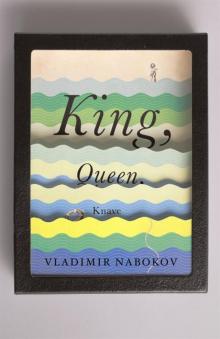 King, Queen, Knave
King, Queen, Knave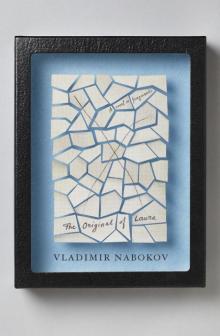 The Original of Laura
The Original of Laura